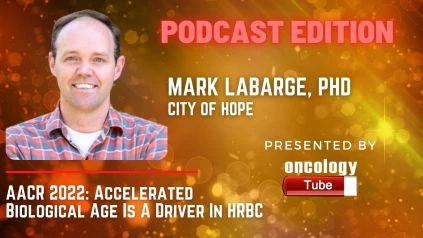Mark LaBarge, Ph.D., professor, Department of Population Sciences, City of Hope. In this video, he speaks about the AACR 2022 Abstract – 5682 – Accelerated biological age is a driver of cancer susceptibility in genetic high risk breast tissue.
Â
Outline
Â
Luminal epithelial cells in the human mammary gland lose lineage fidelity as they age by displaying markers normally present in myoepithelial cells. We postulate that loss of lineage fidelity is a common feature of epithelia that is predisposed to cancer initiation. We show that histologically normal breast tissue from younger women who are predisposed to breast cancer due to a hereditary mutation in the BRCA1, BRCA2, or PALB2 genes shows signs of accelerated aging. These include higher proportions of luminal epithelial cells that have acquired myoepithelial markers, decreasing proportions of myoepithelial cells, and a basal differentiation bias or failure to differentiate cKit+ progenitors. Transcriptional alterations in high-risk luminal and myoepithelial cells favor genes involved in the opposing lineage, inflammatory, and cancer-related pathways. Using a breast specific biological clock comprising of assessments of methylation and expression of the luminal-specific ELF5 transcription factor, genetically high risk luminal epithelial cells also exhibit evidence of accelerated age, by as much as four decades relative to their chronological age. Breast aging hallmarks have been identified that show convergent biology of cancer susceptibility, regardless of the precise underlying genetic or age-dependent risk, or the associated breast cancer subtype.

